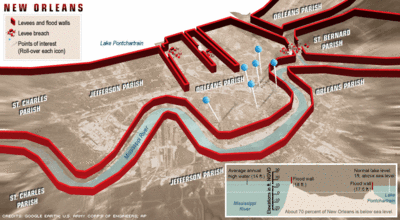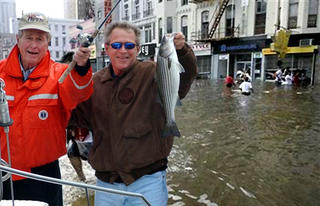Here's a provocative -- perhaps incendiary -- thought that we probably should, but almost certainly will not, think seriously about as we move away from responding to the Katrina catastrophe and toward the process of rebuilding New Orleans: Should we tell the City and its residents that, while we will help them re-build this time, the next time they are on their own.
I don't pretend to have the answers to that question. But I do think it needs to be debated, and, for the moment, I propose to play devil's advocate. That is, I want to try to make the case for telling New Orleans that, while we are willing to help them re-build, we are not willing to subsidize a reconstruction in the same location.
Several hundred billion dollars of taxpayer money will be spent responding to the Katrina catastrophe. The vast, vast majority of that money will come from taxpayers who do not live in or anywhere near New Orleans and obtain little or no benefit from its particular location. I do not begrudge the victims that money. However, I do question the extent to which taxpayers in the rest of the country have the duty to act as insurers of New Orleans' future if the residents choose to rebuild the City in the same, utterly stupid, place.
There is something bordering on madness in building a City of a million or more people in a bowl that is mostly below sea level and located only a few miles from a stretch of ocean that sees multiple hurricanes every year. That madness has always been obvious to anyone who has ever thought even briefly about the issue. Yet, prior to Katrina, we were faced with a fait accompli: the City already existed, and moving the City and its people to some more sensible location was simply not possible.
Things have changed now, though. A significant proton of the City has been destroyed and virtually all of its residents have been driven into a diaspora. The homes and businesses of these people need to be rebuilt, and the rest of the country does have an obligation to assist in this effort, since it is so plainly far beyond the resources of both the victims themselves and local governments. But, to the extent the rest of the country is footing the bill, we also have some say in how our money is spent.
The instinctive impulse of everyone involved will be try to restore what was lost and to seek to better protect the affected people and property with ever higher levees and ever stronger anti-flood defenses. But that impulse is driven more by nostalgia and stubbornness than it is by good sense. Moreover, the enormous costs of that alternative will be borne primarily by millions of people who obtain no benefits from New Orleans' location while the benefits, if any, will be enjoyed only by those who live or visit there.
If there were some way to assure that a similar catastrophe will not recur, nostalgia and stubbornness might provide sufficient justifitication for the investment. But there is no such assurance. In fact, regardless of what is done to provide greater protection, another similar catastrophe is a statistical certainty so long as the City remains where it is. And, at that point, the rest of the Country will be faced with yet another fait accompli requiring the residents of Iowa to spend yet more money to extricate the residents of New Orleans from the consequences of their folly in living where they do.
We cannot refuse to help the City re-build itself. We can, however, refuse to subsidize folly. The current situation must be stabilized. But before we pour hundreds of billions of dollars into the effort to re-build New Orleans and protect it from the consequences of Katrina II, the alternative of using that money to relocate the City to higher ground ought to be seriously considered.
In light of this, I offer the following modest proposal. First, we should refuse to invest in significant improvements to the existing levee system. What is there already should be repaired and we should be willing to participate in that effort. However, since there is no way to construct a system of defenses that will eliminate the risk that areas below sea level will be inundated, we do not intend even to try.
Second, federal dollars should only be used for the construction or reconstruction of buildings and infrastructure that are above sea level. Areas of the City that are below sea level need to be abandoned so as to provide "defense in depth" as a backup to the existing levee system. The additional land needed to replace abandoned homes and businesses will have to be found on the landward side of the Mississippi River or in other locations that are above sea level if federal help is expected.
Finally, and perhaps most important, if State and local authorities choose to allow sub-sea-level portions of the City to be restored, they, the people who elect them, and most especially the people who choose to build in such locations, must be made to understand that the nation is not responsible for protecting those homes and businesses and will not pay to have the damage repaired if they are destroyed by another hurricane.
Contrary thoughts are welcome, even hoped for.


